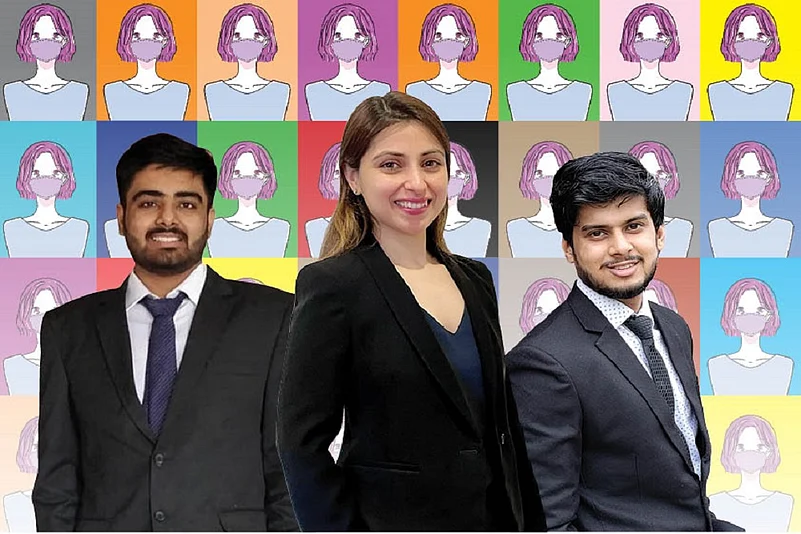In this week’s edition of ‘Just Started’ we introduce three exciting startups, from the varied sectors of contract management to deep-fake detection. The pandemic has ushered a digital wave, and riding on it are the entrepreneurs of FieldProxy, Kroop.ai and Solvio. They are using technology to solve various problems from managing on-gound teams to grading school test papers.
Dreams Riding The Digital Wave: Young Indian Entrepreneurs, Breaking New Ground
These are young energetic entrepreneurs who want to make a mark. Fresh ideas, dreams and hopes bundled together – some are creating an identity some breaking new ground. Starting today, every Saturday we bring you stories of young budding entrepreneurs who have – Just Started.

Streamlining On-Ground Teams, DIY Style

This Chennai-based start-up is hoping to bring order to field team management
FieldProxy is a SaaS platform that helps field servicing companies better manage their on-ground teams.
Founders Balakrishna Balasubramanian, a BITS-Pilani graduate, and Swaroop Vijayakumar, an IIM-Kozhikode graduate, met in 2015 and after their first venture, a video news app, shut down, started Codemycompany which offered tech products.
“A few batchmates from IIM Kozhikode working in FMCG companies reached out to me regarding the difficulty they were facing while building field teams and wanted to find a way to streamline their field sales operations,” says Vijayakumar.
The duo worked on one project for ITC in 2018 and went on to work with many teams to implement their software. “We spent most of 2019 researching, meeting companies and understanding the team requirements. We realised it was too big an opportunity to miss out on and decided to shut down Codemycompany and start Fieldproxy,” says Vijayakumar. Fieldproxy was officially launched in November 2020.
With Fieldproxy, managers get access to a dashboard that can be modified as per the company’s requirements like modules for attendance, customer verification and such. The field team will have a mobile app that is linked to this dashboard. “We are the only tool in the space that provides an app builder for you to customise your own,” he explains, adding that they provide continued basic support.
While Fieldproxy’s core is still home servicing and FMCG, it currently has around 35 clients across industries, including agriculture and diagnostics.
Currently, they have a monthly subscription model where the clients pay between Rs 400 to Rs 800 per field user. The amount changes based on the requirements and customisations.
They have also forged partnerships with companies offering complementary services and products, a GPS hardware manufacturing firm with 3,000 clients, for instance, to help them scale up their brand presence and name.
?
Separating Fact From Fiction
This anti-deepfake technology start-up aims to help you detect manipulated videos online
Over the past few years, visuals of politicians and businessmen making scandalous statements have been circulated across the internet, most of which are far from reality. While the visuals may be original, the voices have been manipulated.
Kroop.ai hopes to make finding these manipulations as easy as clicking a button.
“During election time in the US, there were a lot of these popular deepfakes doing the rounds and I realised that there was no specific tool that could validate their authenticity. There are a lot of fake news busters but those are text-based,” says founder Jyoti Joshi, a Melbourne-based researcher.
Deepfakes, Joshi explains, are synthetic media generated by artificial intelligence where someone is made to say and do something through manipulation of facial expressions and audio.
Joshi and IIT- Ropar alumni Milan Chaudhari and Sarthak Gupta, who were already working in the tech space, formally established Kroop.ai in February 2021.
“The problem is very niche and in the Asia Pacific region, there are no companies (dealing with it). The threat is new and so is the whole set-up around its detection,” says Joshi.
Kroop.ai has an API, a portable version more suited for large-scale systems that can integrate it into their existing system for verification. It also has a website where a piece of media, a file or a folder can be uploaded. There are two more access points to the tool – the mobile app and the web scraper, a keyword-based system that scans the medium for potential manipulation.
While the website just provides the probability of the video being manipulated, the tool offers a detailed analysis in terms of the percentage of manipulation and the aspects of the video that have been manipulated. On an average, it costs a user $1 per minute of video analysis.
The founders say that their current focus is on the B2B market and they’re in talks with banking, corporate and strategy companies. The company has seen a demand for the tool in the BFSI sector with a growing number of video KYCs.
Kroop.ai is currently in talks with two fact-checking companies, one US-based cybersecurity firm and a leading private bank in India. It received its first set of funding from 100x.vc in May 2021.
Teachers’ Patience Won’t Be ‘Tested’ Anymore, Thanks To Solvio

Edtech companies can incorporate the API for grading for select subjects, for grades 1 through 12
Only a teacher knows how tedious it is to read children’s test papers and grade them. So, what if there was an AI bot to help them? Solvio is just that.
It allows students to take a photo of their paper, upload it and get instant feedback using the start-up’s API.
Founders and cousins Rohit Pentapati and Raviteja Manepalli, and a family member, a Bengaluru-based Math teacher, talked about the nightmare of grading papers which made them think about automating the process. The two quit their jobs in June 2019 and got to work.
Officially launched in December 2020, the founders initially thought of selling it to schools. Solvio was incubated at IIM Bangalore and offered to international schools initially. When the pandemic struck and schools shut down, the founders adapted by pivoting their business model to offering the tech as an API to other edtech companies. “We could let them integrate our technology with their products and push it into the market through already established channels,” says Pentapati. They got their big break when a New York-based company showed interest in their product.
The duo began improving the product based on feedback and roped in data contractors to structure raw data to train the AI bot. They also hired people with a background in machine learning from IIT Kanpur to fine-tune the product.
With online education becoming mainstream due to Covid-19, there are many opportunities, Pentapati says. Most online assessments rely on multiple-choice questions but with Solvio, the students can hand write detailed answers and let the AI bot grade them. That also enables a blended learning experience. Currently, the start-up focuses on math, sciences and social sciences for grades 1 to 12.
Today, the product is being used by 12 edtech companies. Eventually, they plan to win over schools, as well.

























